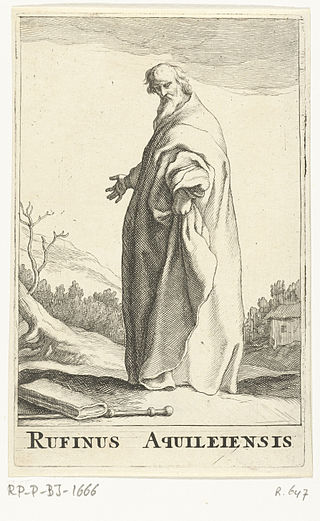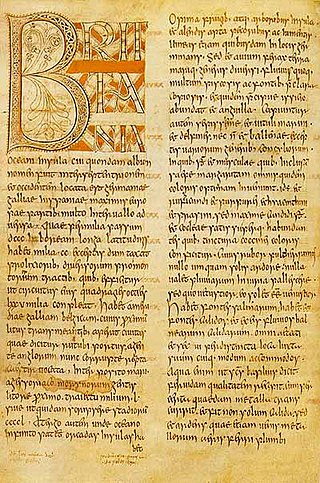Related Research Articles

Ebionites as a term refers to a Jewish Christian sect, which viewed poverty as a blessing, that existed during the early centuries of the Common Era. The Ebionites embraced an adoptionist Christology, thus understanding Jesus of Nazareth as a mere man who, by virtue of his righteousness in following the Law of Moses, was chosen by God to be the messianic "prophet like Moses". A majority of the Ebionites rejected as heresies the Orthodox Christian beliefs in Jesus' divinity, virgin birth and substitutionary atonement; and therefore maintained that Jesus was born the natural son of Joseph and Mary, sought to abolish animal sacrifices by prophetic proclamation, and died as a martyr in order to move all Israel to repentance.

James the Just, or a variation of James, brother of the Lord, was "a brother of Jesus", according to the New Testament. He was an early leader of the Jerusalem Church of the Apostolic Age. Traditionally, it is believed he was martyred in AD 62 or 69 by being stoned to death by the Pharisees on order of High Priest Ananus ben Ananus.

Serapion was a Patriarch of Antioch (191–211). He is known primarily through his theological writings, although all but a few fragments of his works have perished. His feast day is celebrated on October 30.

Tyrannius Rufinus, also called Rufinus of Aquileia or Rufinus of Concordia (344/345–411), anglicized as Tyrann Rufine, was a monk, historian, and theologian. He is best known as a translator of Greek patristic material, especially the work of Origen, into Latin.

The Ecclesiastical History of the English People, written by Bede in about AD 731, is a history of the Christian Churches in England, and of England generally; its main focus is on the conflict between the pre-Schism Roman Rite and Celtic Christianity. It was composed in Latin, and is believed to have been completed in 731 when Bede was approximately 59 years old. It is considered one of the most important original references on Anglo-Saxon history, and has played a key role in the development of an English national identity.
Saint NinoEqual to the Apostles and the Enlightener of Georgia was a woman who preached Christianity in the territory of Caucasian Iberia, of what is now part of Georgia. It resulted in the Christianization of the royal house of Iberia, with the consequent Christianization of Iberia.

Simeon of Jerusalem was a Jewish Christian leader and according to most Christian traditions the second Bishop of Jerusalem, succeeding James, brother of Jesus. Simeon is sometimes identified with Simon, brother of Jesus, and has also been identified with the Apostle Simon the Zealot.

The Diocletianic or Great Persecution was the last and most severe persecution of Christians in the Roman Empire. In 303, the emperors Diocletian, Maximian, Galerius, and Constantius issued a series of edicts rescinding Christians' legal rights and demanding that they comply with traditional religious practices. Later edicts targeted the clergy and demanded universal sacrifice, ordering all inhabitants to sacrifice to the gods. The persecution varied in intensity across the empire—weakest in Gaul and Britain, where only the first edict was applied, and strongest in the Eastern provinces. Persecutory laws were nullified by different emperors at different times, but Constantine and Licinius' Edict of Milan in 313 has traditionally marked the end of the persecution.
Saint Matthias of Jerusalem was a 2nd-century Christian saint and a Bishop of Jerusalem, whose episcopacy was about 113–120 AD.

The Church History of Eusebius, the bishop of Caesarea was a 4th-century pioneer work giving a chronological account of the development of Early Christianity from the 1st century to the 4th century. It was written in Koine Greek, and survives also in Latin, Syriac and Armenian manuscripts.

Christianity in the 1st century covers the formative history of Christianity from the start of the ministry of Jesus to the death of the last of the Twelve Apostles and is thus also known as the Apostolic Age. Early Christianity developed out of the eschatological ministry of Jesus. Subsequent to Jesus' death, his earliest followers formed an apocalyptic messianic Jewish sect during the late Second Temple period of the 1st century. Initially believing that Jesus' resurrection was the start of the end time, their beliefs soon changed in the expected Second Coming of Jesus and the start of God's Kingdom at a later point in time.

Early Christianity spread from the Levant, across the Roman Empire, and beyond. Originally, this progression was closely connected to already established Jewish centers in the Holy Land and the Jewish diaspora. The first followers of Christianity were Jews or proselytes, commonly referred to as Jewish Christians and God-fearers.
Tobias Bishop of Jerusalem, was the 2nd Century, fifth Bishop of Jerusalem. He was acquainted with Thaddeus of Edessa who was involved in healing, being one of the Seventy disciples.
Benjamin I of Jerusalem was the 2nd-century 6th bishop of Jerusalem. According to Eusebius of Caesarea he was a Jewish Christian. His short episcopacy was only from about 116 to 117 AD. He was possibly killed in the persecution of Hadrian (117–138), His Feast Day was December 11.
Philip Bishop of Jerusalem, was a 2nd-century Jewish Christian leader and Bishop of Jerusalem, whose episcopacy was about 120-124AD.
Justus II of Jerusalem was a 2nd-century Jewish Christian bishop of Jerusalem.
Levis of Jerusalem was a 2nd-century Jewish Christian bishop of Jerusalem.
Ephram of Jerusalem was a 2nd-century Jewish Christian bishop of Jerusalem.
Joseph I of Jerusalem was a 2nd-century Jewish Christian bishop of Jerusalem.
Senecas of Jerusalem was a 2nd century Jewish Christian bishop of Jerusalem.
References
- ↑ Historia Ecclesiastica , IV, v."
- ↑ "Historia Ecclesiastica, II, i."
- ↑ The Departure of St. John, Bishop of Jerusalem Archived 2015-09-06 at the Wayback Machine .